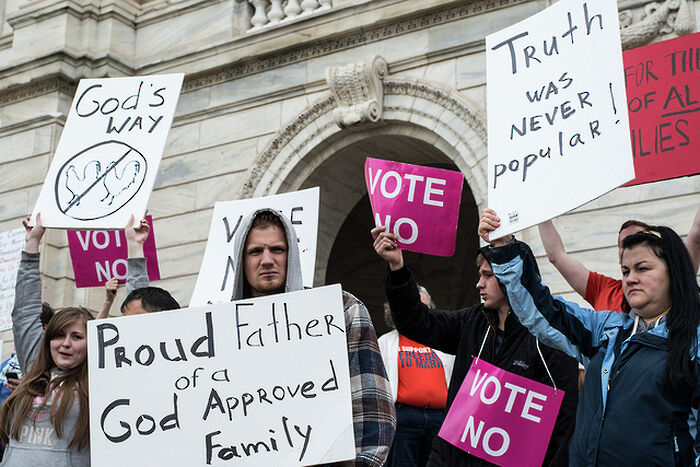Simple steps toward gender neutrality would change our University for the better
Rebecca Hickman, a member of the CUSU LGBT+ Committee, argues that arbitrary rules can deeply affect the lives of trans and non-binary students

We must tackle the unnecessary gendering of life and facilities at the University of Cambridge. The new ‘Why Gender-Neutral?’ campaign by CUSU LGBT+ is aiming to raise awareness and provide suggestions and resources to those in a position to change things.
The University can still feel unaccommodating to trans and non-binary students, despite its forward-thinking nature in many respects. Staff are, in general, very receptive to suggestions to make things better, but the solution is not always obvious to those without first-hand experience. That’s why this campaign exists: to explain the problem and give clear answers as to what can be done. De-gendering bathrooms, dress-codes and admin in the University would be a solid step in the right direction, and these are the campaign’s core objectives.
The solution is, on paper, so simple
First, let’s take a look at the problem: imagine that, going about your day as a student, you are out-of-the-blue referred to with a name that is no longer yours. Maybe you haven’t used it for years. At first you correct people, but in time it gets exhausting and tedious. You go to the bathroom only to be faced with a no-option scenario: male or female. You remember in the past having your gender policed when you used the one you felt more comfortable with. You search your mind for the nearest gender-neutral loo only to draw blanks. In the evening your friends are going to a college formal, but there are no dress options you feel comfortable with, so you have decided not to join them. When you get home, you contact other trans people for a bit of affirmation: to confirm that, yes, your name really is your name.
It is a needlessly frustrating, tiring and dissociation-inducing way to go about what should be routine and innocuous activity. It turns basic human functions into a source of completely unnecessary stress. It distracts you from your studies, disrupts your plans, and makes the studies/mental health balancing act just that bit more difficult to pull off.
And the worst thing about it is that the solution is, on paper, so simple: make gender-neutral bathrooms the standard, open up dress codes to provide options beyond the suit/dress dichotomy, and adjust forms, databases and communications to be less gendered.
The point of formals is to look smart, not to climb into one of two binary boxes for an evening
Every bathroom, in every college, faculty, and University building, should be made gender-neutral. There should be no more male/female signs, which should be replaced with simple ‘Toilet/WC’ signs accompanied by a ‘Stalls and urinals’ or ‘Stalls only’ indicator. Additionally, all cubicles should have sanitary bins, including in formerly ‘male’ bathrooms.
On dress codes, many colleges have opted to keep their codes as-is but remove any reference to gender. This does not really fix the problem as the suit/dress dichotomy remains. There should be options for mixing-and-matching, and it needs to be clear who students can contact to enquire about alternative dress options. The point of formals is to look smart, not to climb into one of two binary boxes for an evening.
Regarding admin, we suggest that gendered language such as ‘Sir/Madam’ and ‘s/he’ should no longer be used in University communications. Where the preferred title and pronouns of the recipient is not known, the default should be ‘To whom it may concern’ and the singular ‘they/them’. Forms, on the other hand, should provide an open box for the field of gender, whilst a ‘preferred pronouns’ field should become standard.
A long-standing source of frustration for trans students is the sheer complexity of the procedure for changing names, gender markers, and other personal information in the University’s various systems. Currently there is no centralised way to go about this: students must chase up many different strands at once to change information with the central University offices, colleges, faculties, and the numerous databases the University maintains. Even having done this, students cannot guarantee that incorrect information will not surface somewhere. We suggest that a member of staff or an office (most obviously the Student Registry) be identified to guide people through the process, or to take care of it for them.
These changes, of course, would not solve everything. But, taken together, they would remove many of the sources of stress for trans and non-binary people at Cambridge. They would also benefit non-trans people by opening up dress-codes, easing the process of changing personal information (which anyone may need to do at some point), increasing the provision of sanitary bins in previously ‘male’ loos, and altogether lifting the unnecessary and arbitrary gendering of Cambridge life. CUSU LGBT+ hopes that you will support us in spreading the word, achieving our goals and, in the process, making our University an even better place to study.
Rebecca Hickman is a trans and non-binary representative on the CUSU LGBT+ Committee.
 News / CUP announces funding scheme for under-represented academics19 December 2025
News / CUP announces funding scheme for under-represented academics19 December 2025 News / SU reluctantly registers controversial women’s soc18 December 2025
News / SU reluctantly registers controversial women’s soc18 December 2025 News / Cambridge welcomes UK rejoining the Erasmus scheme20 December 2025
News / Cambridge welcomes UK rejoining the Erasmus scheme20 December 2025 Features / Should I stay or should I go? Cambridge students and alumni reflect on how their memories stay with them15 December 2025
Features / Should I stay or should I go? Cambridge students and alumni reflect on how their memories stay with them15 December 2025 Film & TV / Timothée Chalamet and the era-fication of film marketing21 December 2025
Film & TV / Timothée Chalamet and the era-fication of film marketing21 December 2025










